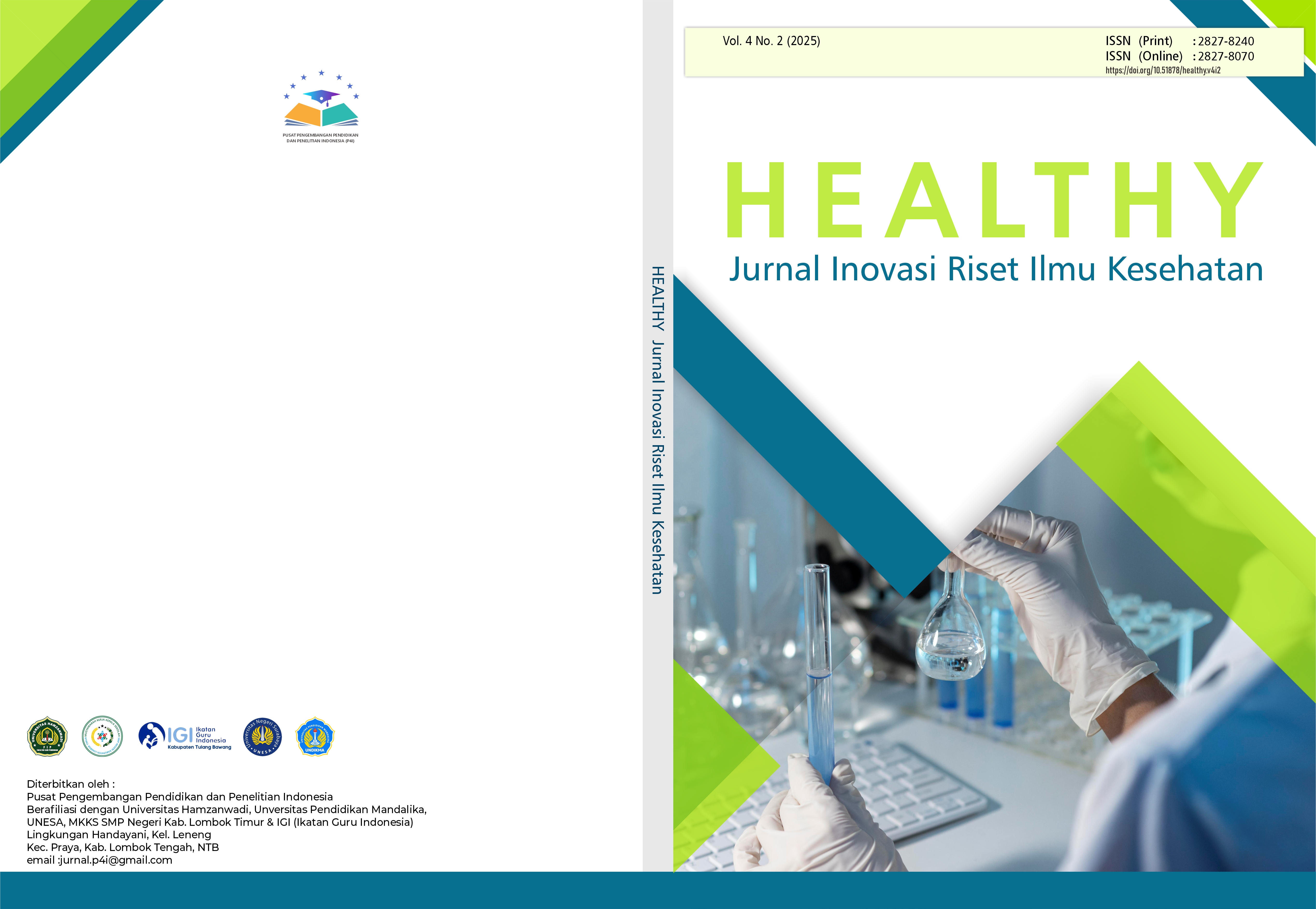GAMBARAN DUKUNGAN SUAMI TERHADAP PEMAKAIAN KB METODE KONTRASEPSI JANGKA PANJANG IUD DAN IMPLANT DI WILAYAH PUSKESMAS SILO 1
DOI:
https://doi.org/10.51878/healthy.v4i4.7176Keywords:
Dukungan Suami, KB MKJPAbstract
Long-Term Contraception (LTC) is a highly effective contraceptive, covering a long duration and working for up to 10 years. There are many types of modern contraceptives that can be used either short-term contraceptives (Non MKJP) injections, pills and condoms or using long-term contraceptives (MKJP) IUD, MOW, MOP, and implants. The use of MHJP is strongly influenced by individual factors, because the decision whether or not to use a type of contraception remains at the individual level. Cognitive factors susch as knowledge, attitudes, and discussions with partners about the use of MKJP family planning. The purpose of this study was to determine the description of husband's support for the use of Long-Term Contraceptive Methods IUD and Implant in the Silo 1 Health Center Region. This research used a descriptive analytic survey. With the research sample subjects of KB acceptors of Long-Term Contraceptive Methods IUD and Implant a total of 90 respondents. Sampling using probability sampling with simple randomization. Husband's support for the use of Long- Term Contraceptive Methods of IUD and Implant is mostly supportive, namely a total of 72.7%, while a small portion does not support a total of 27.3%. There is a picture of husband's support for the use of the Long-Term Contraceptive Method IUD and Implant in the Silo 1 Health Center Region. Recommendations from researchers are that it is hoped that health workers, especially midwives, will provide support for the use of contraceptive methods.
ABSTRAK
Kontrasepsi Jangka Panjang (MKJP) merupakan kontrasepsi yang sangat efektif, mencakup durasi yang panjang dan bekerja hingga 10 tahun. Banyak sekali jenis alat kontrasepsi modern yang dapat digunakan baik alat kontrasepsi jangka pendek (Non MKJP) suntik, pil dan kondom ataupun menggunakan alat kontrasepsi jangka panjang (MKJP) IUD, MOW, MOP, dan implant. Penggunaan MKJP sangat dipengaruhi oleh faktor individu, karena keputusan akan menggunakan atau tidaknya jenis kontrasepsi tetap berada pada level individu. Faktor kognitif seperti pengetahuan, sikap, serta diskusi dengan pasangan tentang penggunaan KB MKJP Tujuan dari penelitian ini adalah untuk mengetahui gambaran dukungan suami terhadap pemakaian KB Metode Kontrasepsi Jangka Panjang IUD dan Implan di Wilayah Puskesmas Silo 1. Metode penelitian menggunakan survey analitik deskriptif. Dengan subyek sampel penelitian akseptor KB Metode Kontrasepsi Jangka Panjang IUD dan Implan sejumlah 90 responden. Pengambilan sampling menggunakan probability sampling dengan acak sederhana. Dukungan suami terhadap pemakaian KB Metode Kontrasepsi Jangka Panjang IUD dan Implan sebagian besar mendukung yaitu sejumlah 72,7%, sedangkan yang sebagian kecil tidak mendukung sejumlah 27,3%. Kesimpulan:Terdapat gambaran dukungan suami terhadap pemakaian KB Metode Kontrasepsi Jangka Panjang IUD dan Implan di Wilayah Puskesmas Silo 1. Rekomendasi dari peneliti adalah diharapkan pada tenaga kesehatan terutama Bidan untuk memberikan KIE secara berkelanjutan terkait dengan pemilihan kontrasepsi metode jangka panjang, di mana dukungan suami sangat berpengaruh terhadap keputusan ber-KB.
References
Abera, R. et al. (2020). Determinants of Implant Utilization Among Married Women of Childbearing Age in Chencha Town, Southern Ethiopia, 2017: A Case?Control Study. BioMed Research International, 2020(1). https://doi.org/10.1155/2020/4324382
Halim, S. et al. (2025). Tinjauan Artikel Laporan Kasus Pertimbangan Pemasangan Implan Gigi Pada Pasien Lanjut Usia. CENDEKIA Jurnal Ilmu Pengetahuan, 5(2), 571. https://doi.org/10.51878/cendekia.v5i2.4744
Khasanah, S. N. et al. (2025). Hubungan Dukungan Suami Dengan Peminatan KB Pasca Persalinan IUD Diwilayah Puskesmas Paleran. HEALTHY Jurnal Inovasi Riset Ilmu Kesehatan, 4(3), 385. https://doi.org/10.51878/healthy.v4i3.7052
Kusumawati, C. S. et al. (2025). Faktor Yang Melatarbelakangi Ibu Hamil Melakukan Kunjungan ANC K1 Akses Di Wilayah Kerja Puskesmas Klatakan. HEALTHY Jurnal Inovasi Riset Ilmu Kesehatan, 4(3), 255. https://doi.org/10.51878/healthy.v4i3.7042
Oktaviana, E. et al. (2025). Hubungan Dukungan Keluarga Dan Kejadian Ikutan Pasca Imunisasi Dengan Ketepatan Waktu Pemberian Imunisasi Suntikan Ganda. HEALTHY Jurnal Inovasi Riset Ilmu Kesehatan, 4(3), 246. https://doi.org/10.51878/healthy.v4i3.7053
Ontiri, S. et al. (2020). Patterns and Determinants of Modern Contraceptive Discontinuation Among Women of Reproductive Age: Analysis of Kenya Demographic Health Surveys, 2003–2014. PLoS ONE, 15(11). https://doi.org/10.1371/journal.pone.0241605
Putri, S. E., & Widati, S. (2020). The Role of Family Social Support in Decision Making Using Long-Term Contraceptive Methods. Jurnal PROMKES, 8(2), 163. https://doi.org/10.20473/jpk.v8.i2.2020.163-171
Qiu, T. et al. (2021). Investigation Regarding Early Cognitive Function of Women in The Postpartum Period and The Analysis of Influencing Factors. Risk Management and Healthcare Policy, 3747. https://doi.org/10.2147/rmhp.s309553
Rahardiyantiningsih, N. et al. (2025). Perbedaan Prevalensi Diabetes Melitus Berdasarkan Riwayat Penggunaan Kontrasepsi Hormonal Pada Wanita Penderita Diabetes Melitus Di Uptd Puskesmas Bangsalsari. HEALTHY Jurnal Inovasi Riset Ilmu Kesehatan, 4(3), 238. https://doi.org/10.51878/healthy.v4i3.7043
Rismawaty, R., & Adioetomo, S. M. (2021). Determinants of Cognitive Impairment Among The Elderly in Indonesia. Jurnal Berkala Kesehatan, 7(1), 29. https://doi.org/10.20527/jbk.v7i1.9786
Saleh, A. et al. (2022). Determinants of Economic Empowerment and Women’s Roles Transfer. Jurnal Penyuluhan, 18(1), 118. https://doi.org/10.25015/18202238262
Sheff, M. C. et al. (2019). The Impact of Adding Community-Based Distribution of Oral Contraceptives and Condoms to a Cluster Randomized Primary Health Care Intervention in Rural Tanzania. Reproductive Health, 16(1). https://doi.org/10.1186/s12978-019-0836-0
Sindunata, N. B. S. et al. (2021). Relations of Knowledge With Perceptions of Eligible Men About Vasectomy in Angsau Primary Health Care, Tanah Laut, South Kalimantan. Indonesian Andrology and Biomedical Journal, 2(2), 48. https://doi.org/10.20473/iabj.v2i2.164
Sulistyowati, A., & Widari, N. P. (2020). Efforts to Increase Interest in Vasectomy Family Planning Acceptors. Nurse and Health Jurnal Keperawatan, 9(2), 240. https://doi.org/10.36720/nhjk.v9i2.214
Supartiningsih, S. et al. (2025). Hubungan Dukungan Keluarga Dengan Kunjungan Antenatal Care (ANC) K4 Di Desa Rowotengah Puskesmas Rowotengah. HEALTHY Jurnal Inovasi Riset Ilmu Kesehatan, 4(3), 393. https://doi.org/10.51878/healthy.v4i3.7044
Winarsih, S. M. S. (2024). Implementasi Sistem Pemilihan Alat Kontrasepsi (SIPAKO) Untuk Pasutri Berbasis Expert System. CENDEKIA Jurnal Ilmu Pengetahuan, 4(1), 10. https://doi.org/10.51878/cendekia.v4i1.2740
Yirgu, R. et al. (2020). “You Better Use The Safer One… Leave This One”: The Role of Health Providers in Women’s Pursuit of Their Preferred Family Planning Methods. BMC Women s Health, 20(1). https://doi.org/10.1186/s12905-020-01034-1
Zulkarnain, Z. et al. (2015). The Impacts of Work-Family Conflict on Burnout Among Female Lecturers. Makara Human Behavior Studies in Asia, 19(2), 87. https://doi.org/10.7454/mssh.v19i2.3477
















